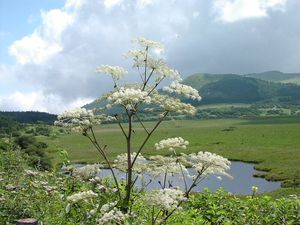
Pinyin: Dong Quai, Tang Kuei Latin: Angelica Sinensis
Physical Characteristics
Angelica Sinensis is a perennial growing to 1m by 0.7m, is hardy to zone 7 and is not frost tender. Angelica Sinensis flowers from August to September, and the seeds ripen from September to October. The flowers are hermaphrodite (have both male and female organs) and are pollinated by Insects. The plant is self-fertile.
Angelica Sinensis prefers light (sandy), medium (loamy) and heavy (clay) acid, neutral and basic (alkaline) soils soils. Agelica Sinensis can grow in semi-shade (light woodland) or no shade and requires moist soil.
Family
Traditional Chinese Medicinal (TCM) Uses:*
Dang Gui is a well-known Chinese herb that has been used in the treatment of female ailments for thousands of years with a reputation perhaps second only to ginseng (Panax ginseng). Angelica Sinensis is particularly noted for its 'blood tonic' effects on women[218].*
Angelica Sinensis root has a sweet pungent aroma that is very distinctive and it is often used in cooking, which is the best way to take it as a blood tonic[254]. One report says that the root contains vitamin B12 and can be used in the treatment of pernicious anaemia[176].*
The root is alterative, analgesic, anticholesterolemic, anti-inflammatory, antispasmodic, deobstruent, emmenagogue, emollient, hepatic, laxative, sedative and peripheral vasodilator[165, 176, 218].*
Dang Quai is commonly used in the treatment of a wide range of women's complaints where it regulates the menstrual cycle and relieves period pain[218, 238, 254] and also to ensure a healthy pregnancy and easy delivery[218].*
Dang Quai an ideal tonic for women with heavy menstruation who risk becoming anaemic[254]. The water-soluble and non-volatile elements of the root increase the contraction of the uterus whilst the volatile elements can relax the muscle of the uterus[176].*
Angelica Sinensis use prevents the decrease of liver glycogen and protects the liver[176] and has an antibacterial action, inhibiting the growth of various bacteria including Bacillus dysenteriae, Bacillus typhi, B. comma, B. cholerae and haemolytic streptococci[176]. The root is an ingredient of 'Four Things Soup', the most widely used woman's tonic in China[254]. The other species used are Rehmannia glutinosa, Ligusticum wallichii and Paeonia lactiflora[254]. The root is harvested in the autumn or winter and dried for later use[254, 283].*
Other Uses
This plant is said to contain vitamin B12[176].*
References
- [165] Mills. S. Y.The Dictionary of Modern Herbalism. 0
- [176] Yeung. Him-Che.Handbook of Chinese Herbs and Formulas. Institute of Chinese Medicine, Los Angeles 1985
- [200] Huxley. A.The New RHS Dictionary of Gardening. 1992. MacMillan Press 1992 ISBN 0-333-47494-5
- [218] Duke. J. A. and Ayensu. E. S.Medicinal Plants of China Reference Publications, Inc. 1985 ISBN 0-917256-20-4
- [238] Bown. D.Encyclopaedia of Herbs and their Uses. Dorling Kindersley, London. 1995 ISBN 0-7513-020-31
- [254] Chevallier. A.The Encyclopedia of Medicinal Plants Dorling Kindersley. London 1996 ISBN 9-780751-303148
- [266] Flora of China 1994
- [283] Nguyen Van Dan & Doan Thi NhuMedicinal Plants in Vietnam World Health Organisation 1989 ISBN 92 9061 101 4
Source: Angelica Sinensis Dang Quai Plants For A Future, England 1996-2008.
This work is licensed under a Creative Commons License.
Natural dietary supplements are designed to offer the body support to promote health, harmony, balance and overall well being.*

 Get Well Natural, LLC
Get Well Natural, LLC  Kidney Function & Regeneration Health
Kidney Function & Regeneration Health  Platelet & Blood Cell Health
Platelet & Blood Cell Health  Prostate, Flow & Function Health
Prostate, Flow & Function Health  General Mind & Body Health
General Mind & Body Health  Heart, Cholesterol & Cardio Health
Heart, Cholesterol & Cardio Health  Allergy-Free Body
Allergy-Free Body  Anxiety & Stress
Anxiety & Stress  Blood Platelet Counts & Function
Blood Platelet Counts & Function  Blood Pressure Health
Blood Pressure Health  Kidney Function Health
Kidney Function Health  Immune System Health & Balance
Immune System Health & Balance  Prostate & Urinary Health Function
Prostate & Urinary Health Function  Blood Sugar Balance
Blood Sugar Balance  Cardiovascular Heart Health
Cardiovascular Heart Health  Detoxification & Healthy Cells
Detoxification & Healthy Cells  Women's Health
Women's Health  Liver Regeneration
Liver Regeneration  Pain-Free Body
Pain-Free Body  Water & Air Filtration
Water & Air Filtration 


